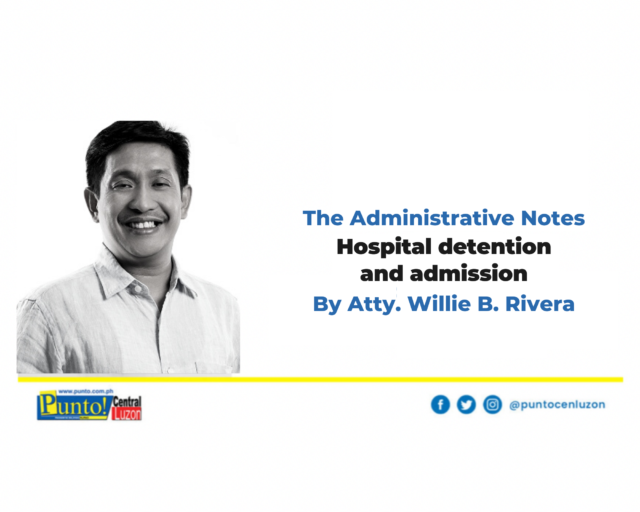Even before I assume the role of City Administrator, my law office has been beset with numerous complaints about patients being detained in hospitals. Now, it seems that the problem persisted despite the enactment of laws that deplore such hospital practices, and in fact penalizes the same.
What exactly is hospital detention? Simple. It is the act of refusing a patient from being released despite a medical clearance because of non full payment of hospital bills. While trying to raise the money for the full settlement of hospital bills, the bills continually increase as the hospital charges additional fees for each additional day in the hospital. In fact, hospital detention does not only apply to living patients, but also for deceased patients, whose bodies are being held up until the full payment of hospital bills.
Its not the rich people who gets affected with this. It’s the poor who gets poorer.. it’s the poor who suffers more.. and it’s the poor who has to deal with abusive hospitals. Never mind if the hospitals charge exorbitantly, or professional fees are preposterous. What matters is their loved ones are released from the hospital.
Republic Act (RA) 9439 or an Act Prohibiting the Detention of Patients in Hospitals and Medical Clinics on Grounds of Non-payment of Hospital Bills or Medical Expenses” declares it “unlawful for any hospital or medical clinic in the country to detain or to otherwise cause, directly or indirectly, the detention of patients who have fully or partially recovered or have been adequately attended to or who may have died, for reasons of non-payment in part or in full of hospital bills or medical expenses.”
Patients who are medically cleared to be discharged but are financially incapable of paying in full their hospital bill “shall be allowed to leave the hospital or medical clinic, with a right to demand the issuance of the corresponding medical certificate and other pertinent papers required for the release of the patient from the hospital or medical clinic upon the execution of a promissory note covering the unpaid obligation. The promissory note shall be secured by either a mortgage or by a guarantee of a co-maker, who will be jointly and severally liable with the patient for the unpaid obligation. Provided, however, That patients who stayed in private rooms shall not be covered by this Act. “
There is a stipulation though that states that Republic Act No. 9439 applies only for patients who stayed in non-private rooms. This issue has been raised quite a few times too. Hospitals would often inform patients that there are no available non-private rooms, when in truth, there are. Hence, patients, particularly those who do not have sufficient money, are constrained to avail of private rooms to get immediate medical attention.
Realizing this “scheme” which most hospitals resort to, a bill was already filed to expand and strengthen Republic Act No. 9439 to include the coverage to private rooms and increasing penalties for violation of the act. Hopefully, the bill would be enacted into law soonest.
While being “discharged” from hospitals is becoming an issue, being “admitted” to hospitals is likewise becoming a problem too. Some hospitals refuse to admit patients without a deposit. This, too, is against the law.
Republic Act No. 10932, otherwise known as the Anti-Hospital Deposit Law provides that “in emergency or serious cases, it shall be unlawful for any hospital or medical clinic to request, solicit, demand or accept any deposit or any other form of advance payment as prerequisite for administering basic emergency care, for confinement or medical treatment, or to refuse to administer medical treatment and support to any patient.”
In other words, under the law, it is unlawful for any hospital to refuse to administer medical treatment without any deposit. Deposit payments should not be made a prerequisite for treating patients. Penalties shall be imposed for violators of the law.
As it is, there are laws that should address the issues of hospital admission and detention. Yet, several hospitals are still refusing to comply with the law. In Angeles City alone, there are hospitals that I have written to, demanding that patients be released after promissory notes are executed. Do I have to write every time a patient is prevented from being released from the hospital? Cant hospitals comply with the laws and do what is incumbent upon them? Do I have to name which hospitals are violating the laws?
During this pandemic, it would definitely lessen the burden of the patients and their families for hospitals to comply with what is incumbent upon them. Trampling with patient’s rights is definitely frowned upon and will never be tolerated. As Florence Nightingale said, “The first requirement in a hospital is that it should do the sick no harm.”





